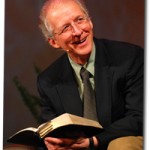 Does God love everybody? Does He love everyone in the same exact way? Before we rush in to answer, we need to research the biblical data. Emotions tend to run high when it comes to these questions because they go to the very heart of something intensely personal to us all, drug our very view of God.
Does God love everybody? Does He love everyone in the same exact way? Before we rush in to answer, we need to research the biblical data. Emotions tend to run high when it comes to these questions because they go to the very heart of something intensely personal to us all, drug our very view of God.
From what I can glean of the Scriptures, I think it would be easy to prove that God has a measure of love for His Son that he does not have for Satan and the demons. That’s fairly obvious of course, but once stated, it does show that although God is love, He possesses the ability to love with differing degrees.
However one interprets the phrase “Jacob I loved, Esau I have hated” (Romans 9:13) I can see no way to avoid the conclusion that God had a different measure of love for one twin above the other.
I believe John 3:16 clearly reveals that God does love the world. “For God so loved the world, that he gave his only Son, that whoever believes in him should not perish but have eternal life.” I have written elsewhere concerning John’s use of the word “world.” He uses it at least 10 different ways in his gospel. Yet I believe the most natural interpretation of “world” in his famous verse (from what I can gather of the context) is that it refers to all the people on planet earth, rather than the elect. I believe the text teaches us that such is God’s love for the human race that He has given them His Son as the Savior. That does not imply a universal redemption for everyone in the world however, for as the rest of the verse teaches, the giving of the Son was for the purpose that the believing ones would in no way perish but instead have everlasting life. God gave His Son as the world’s only Savior. Only through Jesus will anybody be saved in this world, and yet, there is no possibility of a believing one perishing.
Elsewhere in the same chapter, in verses 35 and 36 we read, “The Father loves the Son and has given all things into his hand. Whoever believes in the Son has eternal life; whoever does not obey the Son shall not see life, but the wrath of God remains on him.”
Just as a man is expected to have a different degree of love for his wife than every other man’s wife, or his child, rather than everyone else’s child, or his mother rather than the dog next door, so God has different degrees of love. God set His love on Israel in a way He did not for Egypt. He explains this love in Deut 7:
“6 For you are a people holy to the Lord your God. The Lord your God has chosen you to be a people for his treasured possession, out of all the peoples who are on the face of the earth. 7 It was not because you were more in number than any other people that the Lord set his love on you and chose you, for you were the fewest of all peoples, 8 but it is because the Lord loves you and is keeping the oath that he swore to your fathers, that the Lord has brought you out with a mighty hand and redeemed you from the house of slavery, from the hand of Pharaoh king of Egypt.”
God loved Jacob in a way He did not Esau and this love manifested in his unconditional election (Romans 9:6-13). So God has a love for His elect sheep that is different in dimension to those who are merely goats. In John 17 He says, “I am praying for them. I am not praying for the world but for those whom you have given me, for they are yours.”
There is much to consider on this topic. I would recommend Dr. R. C. Sproul’s book “Loved by God” as a great resource in this regard.
It is interesting that today I read the following from Tommy Clayton, Content Developer and Broadcast Editor at Grace to You.
I can still remember the chair I was sitting in years ago when I read a life-changing page in John MacArthur’s book The God Who Loves. In an economy of words, John exposed, confronted, and changed my thinking on one of the most critical areas of theology, the nature of God. My understanding of God’s love—specifically His love for the non-elect—was never the same.
For months, I had been wrestling with the question of whether God’s love extends beyond those He chose for salvation. “Does God love all humanity, even the Judas Iscariots and Adolf Hitlers of the world?” At the time, I couldn’t answer that question with any degree of certainty. And although I was sitting under sound biblical teaching, I had begun entertaining the idea that God’s elect have a monopoly on His love. I couldn’t reconcile the idea of God loving His enemies with the following texts:
• Psalm 5:5, “You hate all workers of iniquity.”
• Psalm 7:11, “God is angry with the wicked every day.”
• Psalm 26:5, “I have hated the assembly of evil doers.”
Beyond those troubling texts, I was grappling with God’s explicit statements about hating Esau found in Romans 9 and Malachi 1. “Jacob I have loved, but Esau I have hated.” You have to admit, that’s a hard verse to refute. God’s hatred was unrelated to Esau’s conduct or character. It was rooted in His eternal, sovereign purposes.
The more I pondered those verses, the more resistant I became to acknowledging God’s love to all humanity. I failed to see the tragic effects such thinking had on my evangelistic fervency. I had adopted a self-righteous mindset, thinking God was absolutely repulsed by unbelievers—probably just as repulsed as I was. I became blind to all the Scriptures speaking to God’s steadfast love and compassion for the lost. Somewhere along the way, my love and compassion for sinners waned.
I was convinced in my own mind. God loves the elect and hates the non-elect. End of discussion.
But then, I read the following words by John MacArthur:
Scripture clearly says that God is love. “The Lord is good to all, and His mercies are over all His works” (Ps. 145:9). Christ even commands us to love our enemies, and the reason He gives is this: “In order that you may be sons of your Father who is in heaven; for He causes His sun to rise on the evil and the good, and sends rain on the righteous and the unrighteous” (Matt. 5:45). The clear implication is that in some sense God loves His enemies. He loves both “the evil and the good,” both “the righteous and the unrighteous” in precisely the same sense we are commanded to love our enemies.
In fact, the second greatest commandment, “You shall love your neighbor as yourself” (Mk. 12:31; cf. Lev. 19:18), is a commandment for us to love everyone. We can be certain the scope of this commandment is universal, because Luke 10 records that a lawyer, “wishing to justify himself … said to Jesus, ‘And who is my neighbor?’” (Lk. 10:29)—and Jesus answered with the Parable of the Good Samaritan. The point? Even Samaritans, a semi-pagan race who had utterly corrupted Jewish worship and whom the Jews generally detested as enemies of God, were neighbors whom they were commanded to love. In other words, the command to love one’s “neighbor” applies to everyone. This love commanded here is clearly a universal, indiscriminate love.
Consider this: Jesus perfectly fulfilled the law in every respect (Matt. 5:17–18), including this command for universal love. His love for others was surely as far-reaching as His own application of the commandment in Luke 10. Therefore, we can be certain that He loved everyone. He must have loved everyone in order to fulfill the Law. After all, the apostle Paul wrote, “The whole Law is fulfilled in one word, in the statement, ‘You shall love your neighbor as yourself’” (Gal. 5:14). He reiterates this theme in Romans 13:8: “He who loves his neighbor has fulfilled the law.” Therefore, Jesus must have loved His “neighbor.” And since He Himself defined “neighbor” in universal terms, we know that His love while on earth was universal.
Do we imagine that Jesus as perfect man loves those whom Jesus as God does not love? Would God command us to love in a way that He does not? Would God demand that our love be more far-reaching than His own? And did Christ, having loved all humanity during His earthly sojourn, then revert after His ascension to pure hatred for the non-elect? Such would be unthinkable; “Jesus Christ is the same yesterday and today, yes and forever” (Heb 13:8) (John MacArthur, The God Who Loves, 102-03).
John’s simple explanation of those Scriptures compelled me to rethink my position on God’s love. Jesus was God. Jesus loved His neighbors—even His non-elect neighbors. Jesus was a friendto sinners. Jesus loved His enemies—all of them. How could I have missed that? What caused me to overlook such clear, vital truths about the character of God? The answer is pride, that hideous sin lurking in all of us, waiting for the opportunity to express itself.
If you wrestle with some of the verses I listed, or struggle to reconcile God’s love with his wrath, I’d recommend you pick up a copy of John’s book The God Who Loves.
So back to the opening two questions:
(1) Does God love everybody?
I would say “in a certain sense, yes.”
(2) Does He love everyone in the same exact way?
I would say “no, just as His love for Jacob was different from His love for Esau, and just as His love for Israel was different from His love for the other nations, so God has a different measure of love for His elect people than He does for others.”
“For we know, brothers loved by God, that he has chosen you, because our gospel came to you not only in word, but also in power and in the Holy Spirit and with full conviction.” – 1 Thess 1:4,5

 Did you know? Chapter and verse divisions were not part of the original Bible text but were added much later for reference sake. This is something of a mixed blessing. In one way, it is a very good thing because it enables people to find a specific text quickly (imagine a preacher today asking people to turn to a text in Isaiah or Jeremiah and the people having to read through each book until they came across the verse he was refering to). Yet in another way, it is not a good thing as it tends towards people reading only specific texts rather than seeing each verse in its original context. Nevertheless, the chapter divisions and verse numbers have become indispensable as technical references for Bible study.
Did you know? Chapter and verse divisions were not part of the original Bible text but were added much later for reference sake. This is something of a mixed blessing. In one way, it is a very good thing because it enables people to find a specific text quickly (imagine a preacher today asking people to turn to a text in Isaiah or Jeremiah and the people having to read through each book until they came across the verse he was refering to). Yet in another way, it is not a good thing as it tends towards people reading only specific texts rather than seeing each verse in its original context. Nevertheless, the chapter divisions and verse numbers have become indispensable as technical references for Bible study. VERSES: In 1551, Robert Estienne (a.k.a. Stephanus) added verse divisions to his fourth edition of the Greek New Testament, while en route between Paris and Lyons, France. Some scholars, critical of the way he divided verses, suggested he did so while on horseback.
VERSES: In 1551, Robert Estienne (a.k.a. Stephanus) added verse divisions to his fourth edition of the Greek New Testament, while en route between Paris and Lyons, France. Some scholars, critical of the way he divided verses, suggested he did so while on horseback. Does God love everybody? Does He love everyone in the same exact way? Before we rush in to answer, we need to research the biblical data. Emotions tend to run high when it comes to these questions because they go to the very heart of something intensely personal to us all,
Does God love everybody? Does He love everyone in the same exact way? Before we rush in to answer, we need to research the biblical data. Emotions tend to run high when it comes to these questions because they go to the very heart of something intensely personal to us all,  From John’s Gospel, we can make the following scriptural statements:
From John’s Gospel, we can make the following scriptural statements: Far too often, we as Christians are influenced by the culture around us and not by the word of God. It is exactly this tendency that is in view when Romans 12:2 exhorts us, “Do not be conformed to this world, but be transformed by the renewal of your mind…”
Far too often, we as Christians are influenced by the culture around us and not by the word of God. It is exactly this tendency that is in view when Romans 12:2 exhorts us, “Do not be conformed to this world, but be transformed by the renewal of your mind…” It is an unfair, gross distortion to hold that Rome teaches justification by works, while we Protestants teach justification by faith. The more accurate distinction recognizes on both sides the necessity of the work of Christ. Rome affirms that His righteousness is necessary for our salvation, that without it we are without hope. That righteousness, however, becomes ours through infusion. Protestants affirm also that His righteousness is necessary for salvation, that we have no hope without it. It, however, becomes ours through imputation.
It is an unfair, gross distortion to hold that Rome teaches justification by works, while we Protestants teach justification by faith. The more accurate distinction recognizes on both sides the necessity of the work of Christ. Rome affirms that His righteousness is necessary for our salvation, that without it we are without hope. That righteousness, however, becomes ours through infusion. Protestants affirm also that His righteousness is necessary for salvation, that we have no hope without it. It, however, becomes ours through imputation.
 Dr. John Piper:
Dr. John Piper: Dyslexia warps reality: the consequences of which can be catastrophic. It is something that causes great hardship to multitudes in our day. People with normal or even above normal intelligence suffer from dyslexia as the brain oftentimes reverses numbers, letters or words. It is a huge learning handicap and in severe cases can greatly limit education and employment opportunities.
Dyslexia warps reality: the consequences of which can be catastrophic. It is something that causes great hardship to multitudes in our day. People with normal or even above normal intelligence suffer from dyslexia as the brain oftentimes reverses numbers, letters or words. It is a huge learning handicap and in severe cases can greatly limit education and employment opportunities.